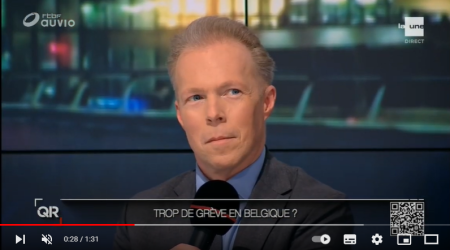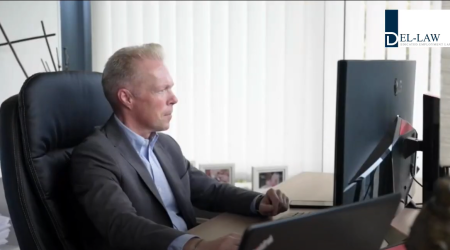Interview with Mr Delmarcelle on RTBF - the draft law on breakers and the potential breach to the right to strike
Posted the 18 May 2023Mister Delmarcelle was interviewed on May 16th on RTBF as part of the QR Actu broadcast regarding the draft law on breakers and potential violations of the right to protest.
Here is a summary.
Is the right to demonstrate in danger in Belgium?
May 16th, 2023 at 09:42
By Bertrand Henne
Is the right to protest under threat in Belgium? The FGTB believes so and is sounding the alarm. In question a text of the Minister of Justice which provides that people convicted of certain acts committed in public demonstrations may be prohibited from demonstrating.
Advertisement
This text is being examined by the Justice Committee of the Chamber today, it is part of a set of measures included in the bill aimed at making the justice system more humane, efficient, and robust. In the realm of a more stringent and repressive approach, we find the provision that allows a judge to impose an additional sentence of temporary prohibition from participating in demonstrations for three years on individuals convicted of acts of violence or vandalism during demonstrations or public events.
The explanatory memorandum to the bill clearly targets individuals often referred to as 'thugs' and highlights the instances of violence that occurred during protests amid the COVID lockdowns. In the text, it states that while most protests and demonstrations proceed peacefully, an increasing number of individuals, often masked, join them with the sole intent of committing violent acts against the police and causing damage. This violence poses a threat to the freedom of expression of all citizens, as well as the right to protest.
The text is modeled after the French example where, since 2019, the law regarding public order has become more repressive, allowing for the prohibition of demonstrations in cases of acts of violence.
Breakers
The text is therefore aimed at "thugs". Why is the FGTB concerned? Because she fears that some judges have a very broad definition of what a breaker is. Thierry Bodson the president of the FGTB fears that a picket where a pallet is burned, a roundabout which is obstructed during a demonstration, are considered by certain judges as coming under this law and can therefore lead to ban on demonstrations.
It is true that the list is quite long: Restriction of the right to participate in protest rallies will only be possible due to violent offenses or acts of vandalism committed in the context of a (previous) protest rally. In summary, the bill covers the following offences: Association de malfaiteurs (322); Threat of attack against persons or against property, punishable by a criminal penalty (327); Homicide (393); Voluntary assault and battery (398 to 401); Voluntary fire (510 to 518); Certain forms of vandalism (520 to 525bis); Destruction or deterioration of foodstuffs, merchandise or other movable property (528 to 534); Damage to immovable property (534ter and 534quater); Offenses against the law on weapons (article 23 law on weapons).
Thierry Bodson does not beat around the bush in Le Soir, he considers that this project is worse than an attack on automatic wage indexation.
Interventionism
This text is part of a fundamental trend. Justice intervenes more and more in social conflicts, and most often in favor of the bosses. It is unmistakable. The interventions of justice in social conflicts were very rare in the 80s, 90s and even 2000s. Remember the very hard conflict of the forges of Clabecq where the militants of the FGTB had blocked the highway with construction machines, justice had acquitted them.
But that time is over. There was the very symbolic condemnation after the blocking of the Cheratte bridge, there were others for malicious obstruction of traffic in Antwerp. And then, the conflict at Delhaize demonstrates that the justice system no longer hesitates to sanction strike pickets in the name of corporate economic law, or the right to work. The bailiffs, sometimes helped by the police, intervene more and more often. With success for Delhaize, management has largely succeeded in reducing the consequences of social protest. The interventions of justice have changed the balance of power between employers and unions.
It is in this context of trade union weakening in the social conflict and restrictive interpretation of the right to strike by the judges that this repressive turn of the screw intervenes in the Chamber. Hence the anger of the FGTB, which therefore appeals to the left parties of the government, socialists and ecologists, to amend or block this text.
Related articles

Consequences for Investors - Strike Law (QR "Le Débat" - RTBF)

Can we block a warehouse and the delivery of stocks? - Right to Strike (QR "Le Débat" - RTBF)
